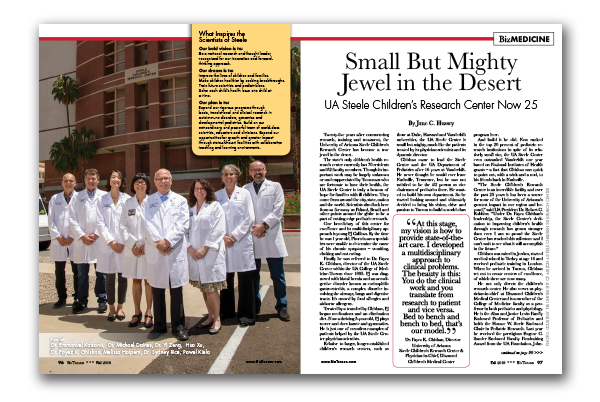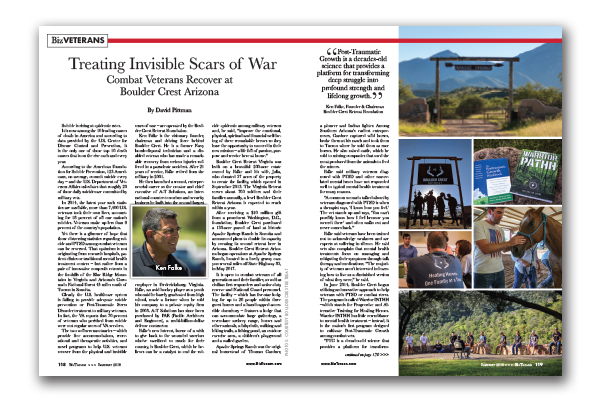
The Haven’s Ambitious Expansion
By David B. Pittman –
Times are tough for nonprofit social service agencies, most of which have been holding the line or curtailing staff and programs because of cutbacks in government spending at all levels.
But The Haven, a Tucson nonprofit behavioral health service that has traditionally provided government-subsidized drug and alcohol treatment to low-income women, is in the midst of an ambitious expansion. And it is doing so largely by launching new entrepreneurial programs that appeal to private clients – both men and women – and insurers.
The Haven’s new direction is guided by Margaret Higgins, the organization’s executive director, who is simultaneously looking to provide treatment services to underserved populations in Southern Arizona and create new revenue streams for The Haven.
“We may be a nonprofit, but that doesn’t mean we can lose money,” she said. “We have been pouring resources into developing new programs that we believe will generate a surplus leading to improved overall services. In these new programs we are relying on private markets, rather than state-paid clientele.”
Policy changes at The Haven have resulted in two monumental shifts. The Haven, which for more than 40 years was known exclusively as a sanctuary for women in need of drug and alcohol treatment, is now serving male clients as well. However, men and women at The Haven receive gender-specific treatment and are housed in separate quarters.
The second major transformation is that residential treatment at The Haven can now be paid through private insurance.
New services at The Haven include Casa de Palmas for Women and Casa de Palmas for Men, both of which provide residential drug and alcohol treatment aimed at middle-class working people. Other new programs include outpatient services for drug and alcohol dependency, DUI counseling and group sessions, and domestic violence classes.
Karen Smith, director of operations at The Haven, said she and others on the staff “feel very positively” about the changes.
“It is exciting to me that we can offer services to more people in a variety of different settings,” she said. “We are increasing the services we have to offer and increasing our client base.”
At this time a year ago, The Haven had 35 employees. Now the organization has nearly 50. The organization’s budget has doubled in the last three years, jumping from slightly more than $1 million to $2.1 million.
Smith said credit for the expansive changes goes to Higgins, who has the confidence of both The Haven’s board and its staff.
Unlike many who head behavioral health agencies, Higgins’ education background is in business, communications and educational teaching. She earned a doctorate in communications from the University of Arizona and has an MBA from the University of Western Australia and a master’s degree in commerce from the University of Otago in New Zealand.
“We have expanded our income streams by offering new services and I firmly believe it will pay dividends down the road,” Higgins said. “My confidence is based on the performance of our staff and the fact that the services we have introduced are sorely needed.”
Higgins has led The Haven since 2005. The first new project under her watch was the Native Ways Program introduced in 2006. Native American women were dropping out of treatment – so The Haven began employing Native American counselors, offered separate housing options and established and encouraged the use of sweat lodges, talking circles, sage burning and other therapies with spiritual and traditional significance. This was so successful that a similar program for Native American men may be added.
Next Higgins began to address the shortage of affordable residential treatment programs to combat drug and alcohol addiction for middle-class clients. That’s why The Haven started the Casa de Palmas initiatives.
While The Haven’s Casa de Palmas programs do not provide resort-style living, like some well-known Tucson substance abuse treatment facilities, they do offer comfortable residential accommodations. Affordability is one of Casa de Palmas’ biggest attractions. While 30-day residential treatment at the resort-style facilities ranges from $31,500 per person to $46,000, the cost of 30 days of treatment at Casa de Palmas is $10,000 to $12,000.
While some clients at Casa de Palmas pay for their own treatment out of pocket, a growing number of stays are paid through health insurance coverage.
“We have been accepted by Humana, CIGNA and United Healthcare,” Higgins said. “Insurance companies are working with us now.”
Casa de Palmas for Women, which began in 2008, is a program housed in an upper-middle class home in a historic Tucson neighborhood. The surroundings are a significant upgrade over the cafeteria-and-dormitory-style living at The Haven’s longtime midtown campus.
In 2011, The Haven began offering the same drug and alcohol treatment programs for men that it offers for women, including a Casa de Palmas for Men.
The organization’s board and staff are committed to gender-specific treatment and segregated housing.
“When you put men and women together in treatment, men tend to take over the group,” said Chris O’Dell, program director of Casa de Palmas for Women. “Women need their own time and space in therapy.”
Morrise Luckey, program director of Casa de Palmas for Men and the Intensive Outpatient Clinic, said male clients also benefit from gender-specific treatment.
“There is a masculine responsibility about being a parent, taking care of your family and how that role is defined,” he said. “Men are reluctant to talk about their problems and their mistakes in that role and how drugs and alcohol relate to their family relationships when women are present.”
The Haven recently began offering a variety of outpatient services at a new location at 2601 N. Campbell Ave., where it also has moved its administrative services. Higgins said a large conference room at this site allows the organization to bring in speakers on issues of addiction and its treatment.
Higgins said the jury is still out regarding the financial success of The Haven’s program expansion.
“It’s been up and it’s been down. One month we generate a surplus and the next month we don’t,” she said. “But we have created great potential through new revenue streams, and if we didn’t go down that path, we would face the same difficulties as every other behavioral health agency in town that is bound by its traditional services.”





